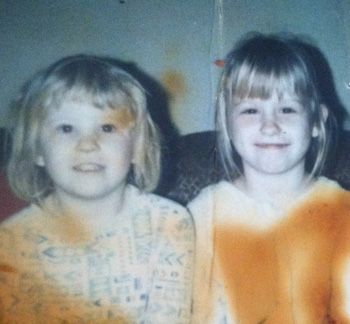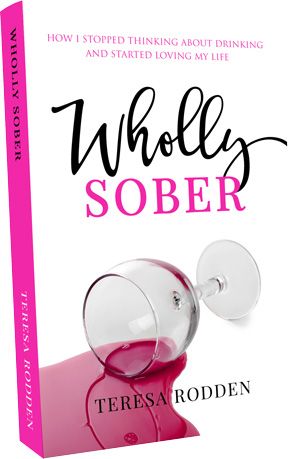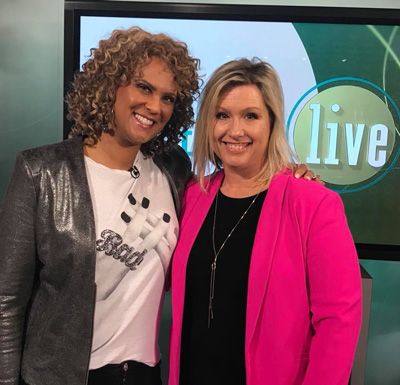Alcoholism is a nasty disease. It takes hold of you and robs you of any common sense and often thrusts you into a path of destruction. There are many rehab programs out there and one that is most common is Alcoholics Anonymous or AA. AA is a 12-step program with the basic principle that you surrender to God and that you are then rendered powerless to the disease.
My guest featured today on Spotlight on eWomenNetwork turns all of that on it's ear. Teresa Rodden is a generational alcoholic who went the traditional route of AA and she was told that she was on a pink cloud and one day she’ll come crashing down. Well, that didn’t sit right with Teresa and she decided she was going to hop on that big pink cloud and trail blaze a new concept for curing alcoholism called, "HOPE," which stands for Having Other Possibilities to Explore. Teresa is the author of Wholly Sober, How I Stopped Thinking About Drinking and Started Loving My Life. She helps you understand what it’s like to be an alcoholic, why these traditional 12-step programs don’t work for everyone, and what HOPE is doing now to save those suffering from this type of addiction.
Watch the video, read the shortened transcript below or click here to listen to the Spotlight on eWomenNetwork Podcast interview at eWNPodcastNetwork.com.
(Partial Transcript with some edits from Interview below)

Drinking at a VERY Early Age
PHYLLIS SMITH: First, you had an early experience at the age of 5 with alcohol. Tell us about that.
TERESA RODDEN: It was Christmas Eve, we were listening to fabulous Christmas music and lights were twinkling. My stepfather had been broken up with my mother and he came over with a bottle of booze and said, “Hey, let’s play a game. The kids can open a gift if they drink this mixed drink.” I had no idea what it was at the time, but I wanted to open the gifts, so I agreed to the terms and drank my rum and Coke. Come to find out, and woke up the next day to my first hangover.
PHYLLIS SMITH: Oh my gosh – at 5-years old!
TERESA RODDEN: At 5-years old, yes.
PHYLLIS SMITH: And your mother was there?
TERESA RODDEN: My mother was there. She didn’t have a healthy relationship with alcohol either and she probably was drunk. I have no idea what her situation was at the time other than she was there.
PHYLLIS SMITH: While the alcohol is killing the brain cells that are forming in your brain. When did it pick up after that? Where you were doing a lot of drinking on your own? Was this, like most kids, as an adolescent?
TERESA RODDEN: It really was, you know I was against alcohol for the longest time up through until I reached 12-years old. I was given alcohol by a neighbor. He was a much older man and as it turns out perverted. He gave me alcohol, and what I realized was as I drank this alcohol that I didn’t feel anything anymore. And to back up a little bit, I had a very traumatic childhood as you can imagine if I got drunk at 5-years old. But I was also a victim of childhood molestation, physical, mental and verbal abuse. When I was introduced to alcohol at 12-years old it felt good to be able to shut it all off.
Alcoholism Isn't All Genetic
PHYLLIS SMITH: The alcohol is shutting you down, but it’s also a disease and they found that it’s also genetic. You have a double whammy of the experiential and trying to block out those horrible experiences through alcohol but it’s also genetic.
TERESA RODDEN: Well, that’s true and false. There can be a genetic predisposition that you will misuse alcohol but it’s not concrete and there is no actual gene that says you are going to be an alcoholic.
,I want to back up even a little bit more, because I don’t identify as an alcoholic, if you read Wholly Sober, I’ve also released my mother and my grandmothers from that identity as well, because what I have found through all my personal experience and through working with women over the last several years is that it’s more of a drunk cycle where there’s a feedback loop in our brains. We get stuck in making poor decisions that causes tremendous pain that we then turn to alcohol and want to numb that pain. It picks up in volume and velocity as time goes on, but what’s interesting is that everyone of the women in my family, including myself, have abstained from alcohol and we have absolutely zero struggle. None. My mother stopped drinking just 10 years ago and she had absolutely no intervention, while I dove deep into outpatient and alcoholic anonymous in the first year and decided if I want to stay sober I must check out something else.

Men and Women Drink Differently
PHYLLIS SMITH: I want to get into more of that as well because you also say women and men drink differently –
TERESA RODDEN: They do.
PHYLLIS SMITH: And you’re saying just because you’re drinking excessively it doesn’t mean you’re an alcoholic. There is a distinction as you’re saying. When did you know you had a problem with alcoholism?
TERESA RODDEN: That’s an excellent question because I knew years before I stopped drinking that I wanted to change my relationship with alcohol, but there was no other option out there. You either identify as an alcoholic and you go the traditional path of Alcoholics Anonymous and 12-steps back in the 90’s, or try to figure it out on your own and without any type of personal development or emotional support. And there is no support out there unless you do identify as an alcoholic. You’re kind of stuck.
PHYLLIS SMITH: When you go in and identify, “Hi, I’m Teresa and I’m an alcoholic” you’re sort of making this declaration That’s part of the rendering yourself powerless and giving into it and I am what I am, what I am, what I am and one day it’s going to happen again, and I must keep coming to meetings so that it doesn’t happen again. Is that the premise?
TERESA RODDEN: Wow! Yeah and I can speak to it so succinctly what I was told is that you will always have a monster inside of you who is doing push-ups, who is getting stronger, no matter how long you abstain from alcohol. It’s always in you waiting for a weak moment so it can take you down, and I literally felt like I was on the edge of a cliff waiting for a wind gust to come through and knock me off. It’s a ticking time bomb. I couldn’t live that way. I couldn’t live the rest of my life that my core sense of self was broken and had a disease that was incurable and waiting for an opportunity to take me out. It wasn’t going to work for me.
PHYLLIS SMITH: That’s obviously a huge challenge to go against the norm but giving into the norm requires you to continue in the program.
TERESA RODDEN: It does. It absolutely says you’ll be going to meetings for the rest of your life.
PHYLLIS SMITH: Do you think that’s why? What is the reasoning behind that?
TERESA RODDEN: It’s to remind you that you have a disease and that you’re out of control. That you’re powerless. That’s the point of the meetings is that you have this community, and I do want to say, and I want to state and say this very clearly, it does work for some people. It just doesn’t work for everybody. I don’t operate with that kind of a mindset, but there are some people that do need to be reminded that they are in trouble if they drink again. That could cost them everything. It is an effective program for some people, and it’s just not for everybody. For the longest time, since 1935, it’s been the only answer.
PHYLLIS SMITH: Wow! It’s amazing isn’t it? 1935. Everything you see, even on the TV shows you’re always seeing somebody’s an alcoholic and somebody’s in a meeting. Yeah, I think it can help. Maybe it’s the community. Having people that can identify with what you’re going through but it sounds like to me it keeps you sick.
TERESA RODDEN: Well, the interesting thing is that it’s the gold standard. It’s the go to program. It’s the one that’s court ordered. It’s the one the hospitals, therapists, and counselors rely on. However, it has less than a 10% success rate. It’s been the only option out there for so many years.

My Big "Aha"
PHYLLIS SMITH: What was your aha when you decided I am not doing this anymore, I don’t want to be an alcoholic, I want to be sober – what was that moment like for you?
TERESA RODDEN: Interestingly enough, when I decided to get sober I was ready for sober and that was it. I don’t think that AA had much to do with it, but I did dive into it. I did the meetings, I did the service work, I led meetings and I sponsored people. I was in it hook, line and sinker. Something had happened, and you can read about it in Wholly Sober to go into further detail, but there was a rift between my sponsor and myself. She was one of the popular gals in our community and that caused a rift with everybody else.
I found myself without a home. I found myself without a community. My husband and I moved down the road a bit and we tried finding another AA meeting, but nothing fit. I was driving down the street and I thought what if I just stop thinking about drinking or not drinking? What if I just focused my energy on going after life instead of I’m sick and have this disease? What if I just don’t make it a focus of my time and energy anymore? That was that and it was over 14 years ago, and I’ve been sober for 15.
PHYLLIS SMITH: Figure out what’s right with you and not what’s wrong with you.
3 Simple Keys to Stop Drinking
PHYLLIS SMITH: You say that Pink Cloud Coaching, that’s your company. People can find you at PinkCloudCoaching.com. Your number 1 tip is what?
TERESA RODDEN: My number 1 tip is you don’t have to be an alcoholic to want to change your relationship with alcohol. All you must do is get clear about what it is that you want. Do I want to live life clear headed or do I want to live life chasing a drink?
PHYLLIS SMITH: You also say it takes time. Not to beat yourself up and think it’s going to happen tomorrow. In your case it seemed to happen immediately, but that’s not necessarily what happens for most people.
TERESA RODDEN: What we need to do is not move that off the table because it can happen. You absolutely can today, you can make the decision, “I am not going to drink again.” It could happen for you. However, you brought up a good point, the tip, the tips it’s going to take time and it’s going to take intention. What are your intentions? What is that you really want? Have something that you’re moving towards and then it’s going to take practice. You must practice it. It’s become a neural pathway for you turn to alcohol to treat your pain or numb the pain so it’s going to take practice for you to develop more natural coping skills:
1. Time
2. Intention
3. Practice
Transcription services provided by our eWomenNetwork member, Rhonda’s Virtual Office.
Want to improve your processes, save time, and make more money?
Contact Rhonda’s Virtual Office. They do it all!










